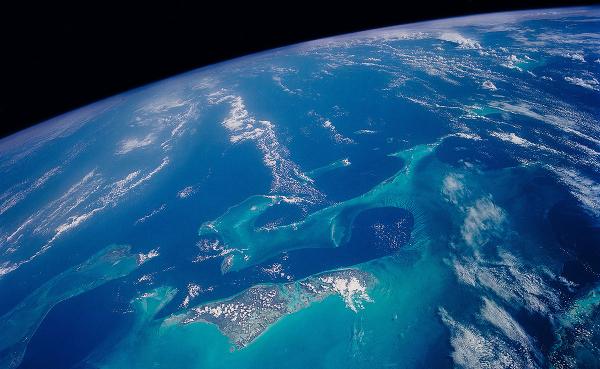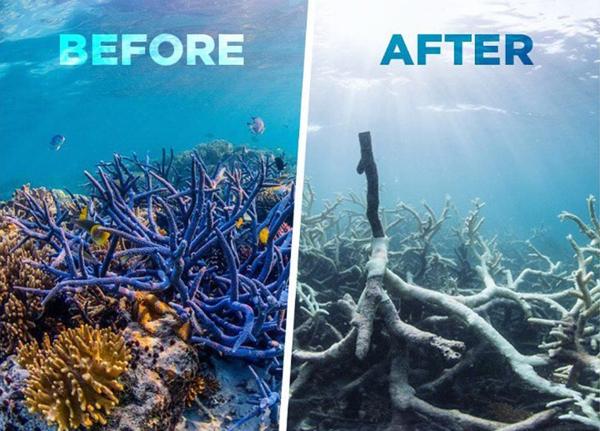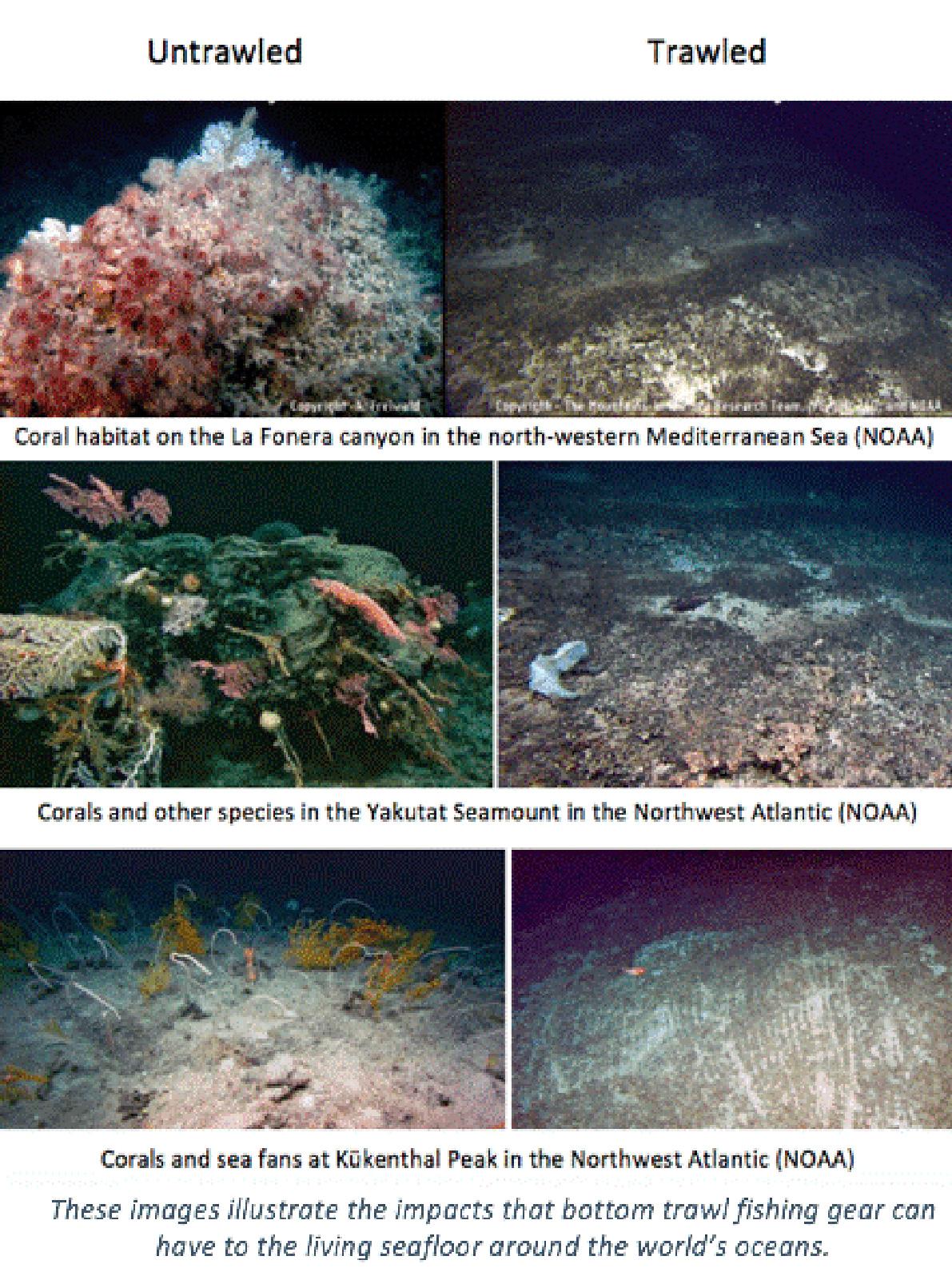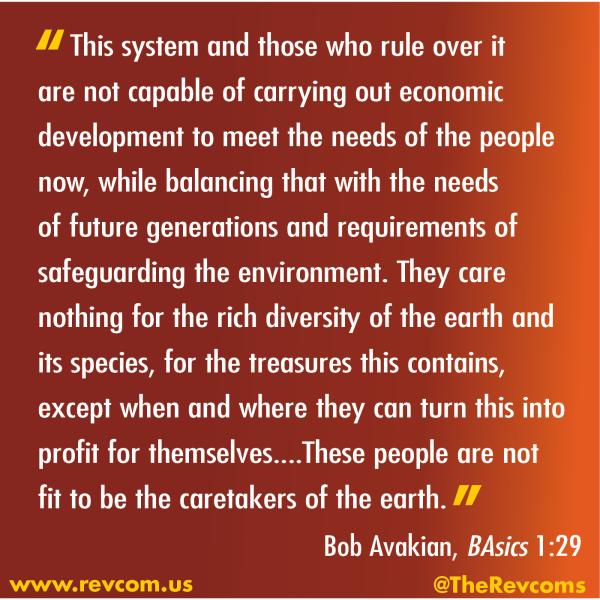Internationalism—The Whole World Comes First.
—Bob Avakian, BAsics 5:8

The Bahamas as seen from space. There is only one ocean—it covers two-thirds of the earth’s surface and most of it is open ocean, not part of any nation’s claimed territory. Life first emerged in the water billions of years ago, and life today cannot exist without the oceans. Photo: NASA
Fundamentally, there is only one ocean (though human geography and politics, for various reasons, conceives it as multiple smaller "oceans" and "seas"). It covers two thirds of the earth’s surface, and most of it is open ocean, not part of any nation’s claimed territory. Life first emerged in the water billions of years ago, and life today cannot exist without the oceans. Over half the oxygen we breathe comes from the ocean. Billions of people depend on fish and other products of the ocean for food. The ocean is an enormous and complex ecosystem, and even today the life in the deep ocean is little understood, and scientists estimate that most of the species don’t even have names.

Hydrothermal vents exist deep down in the ocean where light is unable to penetrate and where the pressure is extreme. They were not discovered until 1977. Despite the extreme pressure and lack of light, a rich diversity of life exists around these vents—life unlike anything else on the planet. In fact a leading theory of the origins of life on earth is that it began deep in the ocean feeding on heat and chemicals from the vents. Science is just beginning to learn about this environment but fishing nets and deep sea mining is tearing these ecosystems apart. Photo: NOAA
The 19th-century scientist and champion of evolution Thomas Huxley considered the ocean so vast as to be inexhaustible, with no danger of ocean life ever being threatened (as capitalist development had already ruined some rivers and seashores near populated areas). But what has come sharply into focus in the 21st century is that healthy oceans—oceans that can sustain anything like the system of life which has evolved through billions of years on the planet—are completely incompatible with the global system of capitalism-imperialism. One or the other will go. It is up to us to decide which one.
Climate change—caused by the system’s burning of fossil fuels—is one devastating driver of the threat to ocean life. The oceans are heating up—90 percent of the heat generated through climate change has been absorbed by the ocean, and this heat is melting polar ice and is one of the main reasons that coral reefs—the richest environment for sea life—are now dying across the planet.1 A hotter ocean makes for more intense and destructive storms and hurricanes. And the carbon dioxide produced by burning fossil fuels is absorbed into the ocean, making it more acidic, which hurts sea life, including making it harder for sea animals to make shells.

Coral reefs before and after bleaching. Coral reefs are the home to 25 percent of all ocean life. While coral can survive a single bleaching, numerous bleaching will kill the coral. Half of coral reefs have been lost since the 1950s due to the effects of global warming, pollution, and acidification. In a 2018 study, the Intergovernmental Panel on Climate Change predicted that 1.5°C of global warming would cause between 70 and 90 percent of the world's coral reefs to disappear. Photo: InformOverload, "The Great Barrier Reef Is Dying," on YouTube.com
Yet it is not just climate change. The open ocean is a kind of “wild west,” where vast fleets of fishing boats drag giant nets through waters thousands of feet deep, which has driven one third of the species of fish humans depend on to near extinction.2 These nets scoop up large numbers of non-targeted animals. This “bycatch”—often fish, and animals like porpoises and turtles that are not the species targeted—are then dumped back into the water, dead. These fleets operate within oceans ruled ultimately by guns—most especially the guns of the U.S., which has not only dominated for many decades but has treated the oceans as an inexhaustible dumping ground, testing nuclear weapons, dumping nuclear waste, nerve gas, and chemical poisons into the sea all over the world.

A catch of fish from ship trawling off the coast of Somalia. Overfishing due to trawling has led to depletion of fish stocks in much of Africa, ruining livelihoods and contributing to hunger and starvation. Ocean trawling is an extremely destructive fishing practice. Trawlers drag nets that reach to the ocean floor scooping up everything that comes in its way. As much as 75 percent of what is caught is what is called “bycatch,” fish (and sea mammals) whose dead bodies are thrown back into the sea. Trawling is particularly damaging to coral and sponges that live on the ocean floor. One marine biologist describes what was left after a trawl: “There was literally a trail of dead and dying things on the seabed." Photo: NOAA
And there is the plastic crisis. According to the Center for Biological Diversity, “Plastic accumulating in our oceans and on our beaches has become a global crisis. Billions of pounds of plastic can be found in swirling convergences that make up about 40 percent of the world's ocean surfaces. At current rates plastic is expected to outweigh all the fish in the sea by 2050.” Plastic has harmed more than 700 species including fish, sea turtles, seabirds, marine mammals, as well as terrestrial mammals including human beings. Plastics churned out by capitalism-imperialism are products of the petrochemical industry that are cheap and lightweight and can be molded into almost infinite shapes and forms. They are now found inside marine life at the bottom of the Mariana Trench, the deepest and most remote place on the surface of the earth. Despite what is known—and what is NOT known—about the harm caused by plastics, it is estimated that this system will greatly increase the highly profitable production of plastics by 40 percent over the next decade.

Eight million tons of plastics enter the oceans every year, much of which has accumulated in five giant garbage patches around the plane. The largest, called the Great Pacific Garbage Patch, is located halfway between Hawaii and California. It covers an approximate surface area of 1.6 million square kilometers—an area twice the size of Texas. Photo: D. Kelly/National Science Foundation
And this is not to speak of the absolute worst environmental threat: the rapidly rising threat of war in the time of nuclear weapons, and its potentially existential consequences, including to life in the oceans.
The destruction of the ocean is accelerating. Climate change and mass extinctions of species, including sea life, is accelerating. What is capitalism-imperialism doing in response? In a nutshell, in addition to continuing to burn more fossil fuel, which drives climate change, it is building bigger fishing boats to hunt more fish, failing repeatedly to complete treaties that would set limits on what the system does to sea life3—and engaging in savage wars, which are enormously intensifying the danger of nuclear war.
The actual state of the ocean today cries out: nothing less than ending the domination of the world by capitalism-imperialism, and nothing less than an approach which puts the international revolution and protecting the environment of the whole world first, above the national interests or local interests of any part of the planet, can begin to solve the problems now posed.
